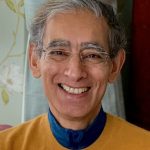 Amar Rughani is a retired GP from Sheffield and leadership mentor and is currently Provost of RCGP South Yorkshire, North Trent Faculty. He is on Twitter: @AmarRughani
Amar Rughani is a retired GP from Sheffield and leadership mentor and is currently Provost of RCGP South Yorkshire, North Trent Faculty. He is on Twitter: @AmarRughani
As we move through our careers, and especially as we move beyond them, we have the opportunity to anticipate a new lease of life. Before we even consider the possibilities, one of my first feelings is that of gratitude. Not everyone gets to this stage or is given the opportunity for a fulfilling life beyond the workplace.
Is it a privilege? Well, it feels like that and whilst I don’t feel guilty because I think I did ‘my bit’, I do feel a sense of responsibility not to squander that opportunity.
Preparation for this phase is at present pretty rudimentary. For example, we are told the importance of how we save for retirement, but little is said about how we spend. Not money you understand, but something much more important, namely ourselves and our time. And from this notion, two questions spring to mind: Firstly, what is valuable about us, or more importantly, what do other people find valuable about us? Secondly, how could we use that? Let’s explore these.
Little is said about how we spend. Not money …. but something much more important …. ourselves and our time.
Because we have been there to listen and to support, we have gained an insight into the nature of being human and into human nature itself, meaning what people are disposed to do. Throughout this process, our own prejudices and biases have been regularly challenged and as a result, if we are fortunate, we have learned the relative folly of jumping to conclusions and the absolute folly of being judgemental.
We are shaped by this, and so our understanding and concern for people, our willingness to help along with our relative open-mindedness, become the core of our identity. This identity is who we are and what people really value us for. And this is important because one of the things we worry about the most at this stage of life, when who we are is not obvious from our nameplate, title, status or paycheck, is the loss of our identity and particularly the loss of our purpose.
Our understanding and concern for people, our willingness to help along with our relative open-mindedness, become the core of our identity.
As we embrace who we are, we enrich what we can do. Suddenly, the motto that guides us through a medical career, cum scientia caritas, or helping people through our understanding of science, becomes a springboard to the bigger vision of cum vita caritas, helping people through our understanding of life and living. And cum vita caritas might be deeply informed by being a doctor, but its expression is no longer dependent on that role.
How we express that is our choice. It will be less through our expertise and contacts because these will fade, but it may be through listening, helping people to grow through mentorship, coaching and so on. More deeply, people value something important but less tangible, namely our ability to give them the confidence to believe in themselves and the confidence to try by ‘doing’ rather than just being ‘done to’. In association with this, they value our willingness to be there for them when they fall, as they will, and need help with getting back on their feet.
Far from being lost, our identity is liberated by no longer being constrained to the workplace.
What we discover will not be impressive, because it’s not seeking to make an impression. However, it will be deeper and more meaningful. For example, we might be an organiser, thinker, creator or in my case helper. I’m drawn towards helping those who need assistance to do it for themselves and whilst this is nothing grand, it is where I feel myself come alive. Each of us has that opportunity to become aware of where we feel most alive and to value and use it, removing the blocks to it wherever they lie. As we spend more time being ourselves, the opportunities to use our strength, if we are aware, will become apparent and will often be offered to us.
Spending ourselves in this way may seem straightforward but paradoxically, the barriers are not likely to be external (money, time et cetera) but to lie more within. We often find it hard to give ourselves permission, living as we have done in communities that are tightly regulated and working with peers whose approval we tacitly seek. Nevertheless, our peers and those close to us can encourage us to take the leap, a leap beyond which permission will no longer be an issue.
Each of us has that opportunity to become aware of where we feel most alive and to value and use it.
Lastly, our new lease of life gives us the opportunity to help our profession, especially during these times of great need. Supporting those who are preparing for life as a GP or who are in the thick of it, is invaluable and necessary. General practice may no longer be our problem, but it will always be, as it was for our predecessors, our concern.
A lifetime of service to the community has shaped what we are and this is an opportunity to embrace that rather than walk away or feel distanced from it. In doing so, the life to come could be the best yet, a phase in which our greatest contribution could be through us rather than for us. The choice is ours.
Featured image by Alexander Milo at Unsplash






